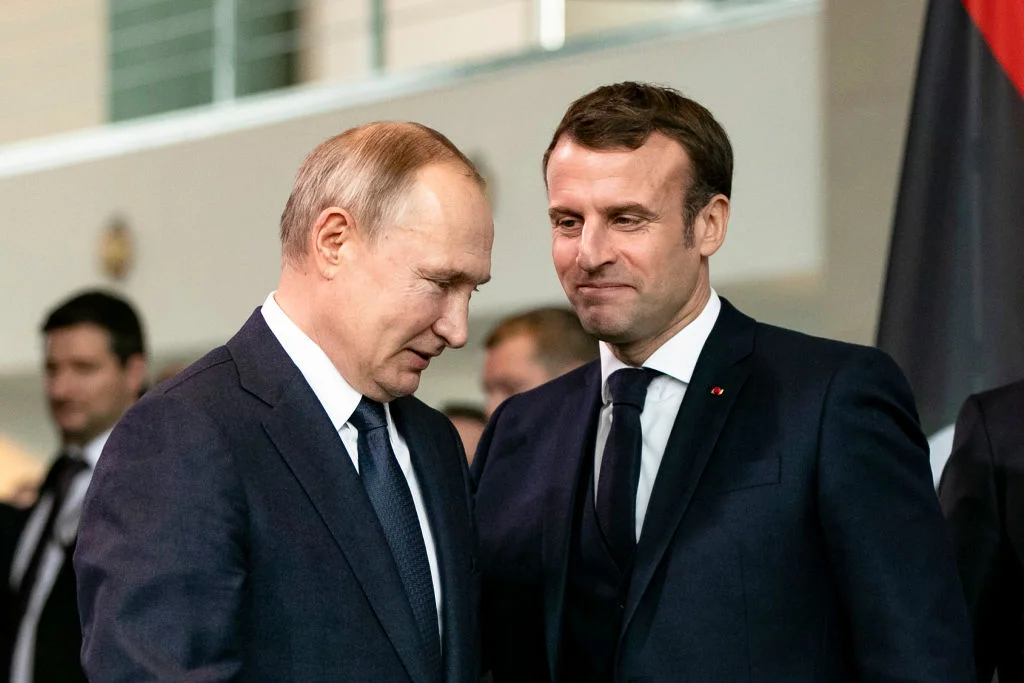French President Emmanuel Macron held a 90-minute phone call with Russian President Vladimir Putin on February 28, 2022, urging him to halt attacks on civilians and civilian infrastructure in Ukraine and to secure major roadways, particularly south of Kyiv, according to a statement from Macron’s office.
Macron also pressed Putin to respect international humanitarian law and allow aid shipments to reach Ukrainian civilians.
The statement claimed Putin “confirmed his willingness to make commitments on these three points,” though no immediate actions followed.
The call came amid escalating violence, with over 350,000 Ukrainians fleeing west and 11 civilians killed in Russian shelling in Kharkiv, as reported by regional governor Oleg Sinegubov.
Putin’s Demands
The Kremlin’s readout of the call outlined Putin’s conditions for ending the invasion, launched on February 24, 2022: demilitarization and “denazification” of Ukraine, Western recognition of Russian sovereignty over Crimea (annexed in 2014), and Ukraine’s neutral status.
These demands, reiterated in subsequent talks, were rejected by Ukraine, with President Volodymyr Zelenskyy demanding an immediate ceasefire and Russian troop withdrawal.
The invasion, involving an estimated 150,000 Russian troops, targeted key cities like Kyiv and Kharkiv, with Ukraine’s resistance bolstered by Turkish drones and Western-supplied Javelin missiles.
Belarus Talks and Tensions
On the same day, Ukrainian and Russian delegations met in a villa owned by Belarusian President Alexander Lukashenko near the Belarus-Ukraine border, as reported by Belarus’ Belta news agency.
Led by Ukraine’s Defense Minister Oleksii Reznikov and Russia’s Vladimir Medinsky, the talks followed Kyiv’s reluctance to negotiate in Belarus, a Russian ally hosting troops and, as announced on February 27, nuclear weapons.
Zelenskyy rejected Belarus as a venue but expressed openness to other locations.
The talks yielded no immediate ceasefire, with Ukraine reporting “very determined resistance” against Russian advances, per a U.S. defense official.
Economic Fallout from Sanctions
Western sanctions, including the exclusion of major Russian banks from the SWIFT financial system, crippled Russia’s economy.
European Commission President Ursula von der Leyen stated, “The exclusion of Russian banks from SWIFT will prevent these institutions from carrying out most of their global financial transactions.”
Russia’s central bank, with €600 billion in reserves frozen, faced a 30% ruble collapse on February 28, fueling inflation and economic turmoil.
France’s Finance Minister Bruno Le Maire called SWIFT a “financial nuclear weapon,” though Germany, Italy, and Hungary initially resisted its use due to energy trade concerns.
Global and Regional Context
The Ukraine crisis unfolded against a backdrop of global challenges, including the Covid-19 pandemic’s 400 million cases and the IPCC’s February 2022 report warning of climate impacts affecting 3.6 billion people.
Turkey’s drone supplies to Ukraine, as noted earlier, strengthened Kyiv’s defense while straining Ankara-Moscow ties.
In Africa, Ghana’s vaccination mandates for football fans and Samuel Takyi’s Olympic boxing medal highlighted resilience amid global disruptions. Posts on X in 2022 reflected outrage over civilian casualties, with Zelenskyy’s call for foreign fighters to join Ukraine’s defense gaining traction, echoing his plea to “save Europe and its values.”






